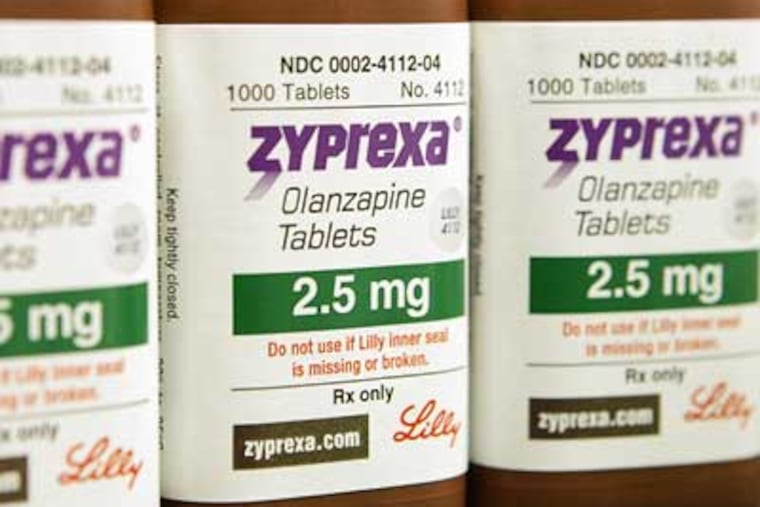Lilly fined $1.4 billion in Zyprexa case
Her name was Martha, and she was the answer to Eli Lilly & Co.'s prayers. Martha was a widow who lived alone and was increasingly confused, agitated and unable to sleep.

Her name was Martha, and she was the answer to Eli Lilly & Co.'s prayers. Martha was a widow who lived alone and was increasingly confused, agitated and unable to sleep.
Only Martha wasn't a real person. She was the face on brochures that Lilly sales representatives handed out to doctors. The pitch: Give your elderly patients Zyprexa, and they will worry less, think more clearly, and sleep better.
Lilly's slogan for the 2000 campaign: Viva Zyprexa!
There was, however, a problem. The federal government had approved Zyprexa to treat only schizophrenia and bipolar disorder, relatively rare diseases not often seen in the elderly.
But Martha was worth a lot to Lilly. The patent on its blockbuster drug Prozac was expiring in 2001. With it, $2.6 billion in yearly sales would evaporate.
Yesterday, Lilly turned over to the federal government $1.4 billion of the $39 billion in sales Zyprexa has generated. The money settles allegations by the U.S. Attorney's Office in Philadelphia that illegal marketing endangered the health of the elderly.
The Indianapolis company also agreed to plead guilty to a criminal misdemeanor charge of misbranding a drug.
The $1.4 billion fine is the largest penalty ever imposed by the Department of Justice, acting U.S. Attorney Laurie Magid said. If Lilly had not settled, the federal government could have banned it from federal Medicaid and Medicare programs.
The agreement serves as a warning to the entire pharmaceutical industry, Magid said.
"We are holding a company accountable for putting thousands of patients at risk," Magid said. "With cases like this one, we are hoping to put an end to the dangerous practice of off-label marketing."
Her message comes at a time when nearly every major pharmaceutical company has been accused of promoting drugs off-label. Drug companies must conduct scientific studies and submit them to the U.S. Food and Drug Administration for approval for specific uses. Promoting them for other purposes is illegal, though doctors may prescribe as they see fit.
The FDA approved Zyprexa in 1996 to treat schizophrenia and some symptoms of bipolar disorder. Over time, research showed that the drug had dangerous side effects, including diabetes and an increased risk of death in elderly patients.
The FDA repeatedly warned Lilly about the risks of marketing the drug to treat symptoms such as dementia, anxiety and aggression in older people, both unapproved uses, Magid said. Despite that, the company marshaled a sales force of 2,000 to promote it to doctors who treat the elderly in nursing homes and to primary-care physicians.
The Viva Zyprexa campaign came with easy-to-remember instructions that Lilly sales representatives boiled down to "5 at 5": Have your patient take 5 milligrams of Zyprexa at 5 p.m. to sleep through the night. The pitch appealed to nursing home managers seeking ways to quiet agitated patients.
Lilly even turned Zyprexa's negative side effects into positives, Magid said. Company representatives pitched weight gain, a side effect that can lead to diabetes, as a positive for frail elderly patients.
By marketing Zyprexa for unapproved uses, Lilly defrauded government programs that paid for the drug, Magid said.
The Indianapolis company says it will pay $800 million to settle civil suits, including $438 million to the federal government and $362 million to states. It will pay $615 million to resolve the criminal probe.
"We deeply regret the past actions covered by the misdemeanor plea," Lilly chief executive officer John C. Lechleiter said. "Doing the right thing is nonnegotiable at Lilly."
Lilly disputed Magid's claim that the company turned to Zyprexa to replace lost Prozac sales.
Magid said she did not know how many patients were harmed by taking Zyprexa for unapproved uses. Separately, the company has spent roughly $1.2 billion to resolve 32,000 claims from patients claiming injury from Zyprexa.
Christine Olenick of Wintersville, Ohio, says Zyprexa killed her 40-year-old husband, Frank Olenick, in 2001, and she has hired the San Francisco law firm of Hersh & Hersh to sue Lilly. Frank Olenick developed diabetes after taking the drug, which was prescribed to treat symptoms of withdrawal from painkillers he had been taking after a job injury.
She hailed the settlement yesterday. "Lilly has ruined so many lives and hurt so many people," Olenick said.
The federal case was brought by nine former Lilly sales representatives who were disturbed by marketing practices they believed were illegal. They are entitled to $78 million of the settlement under whistle-blower laws.
Martha more than earned her keep. Zyprexa remains Lilly's best-selling drug, with about $4.4 billion in sales last year.